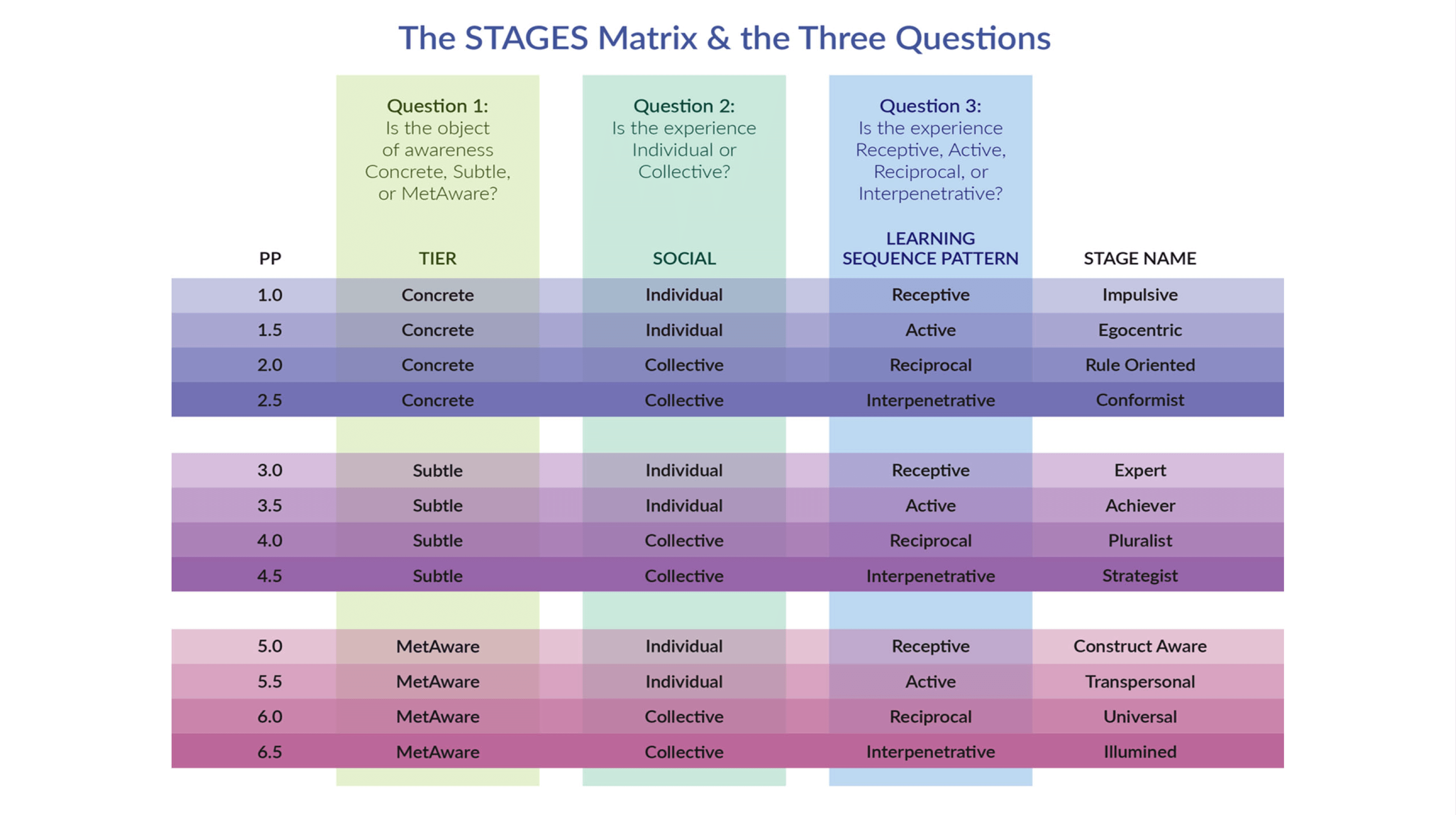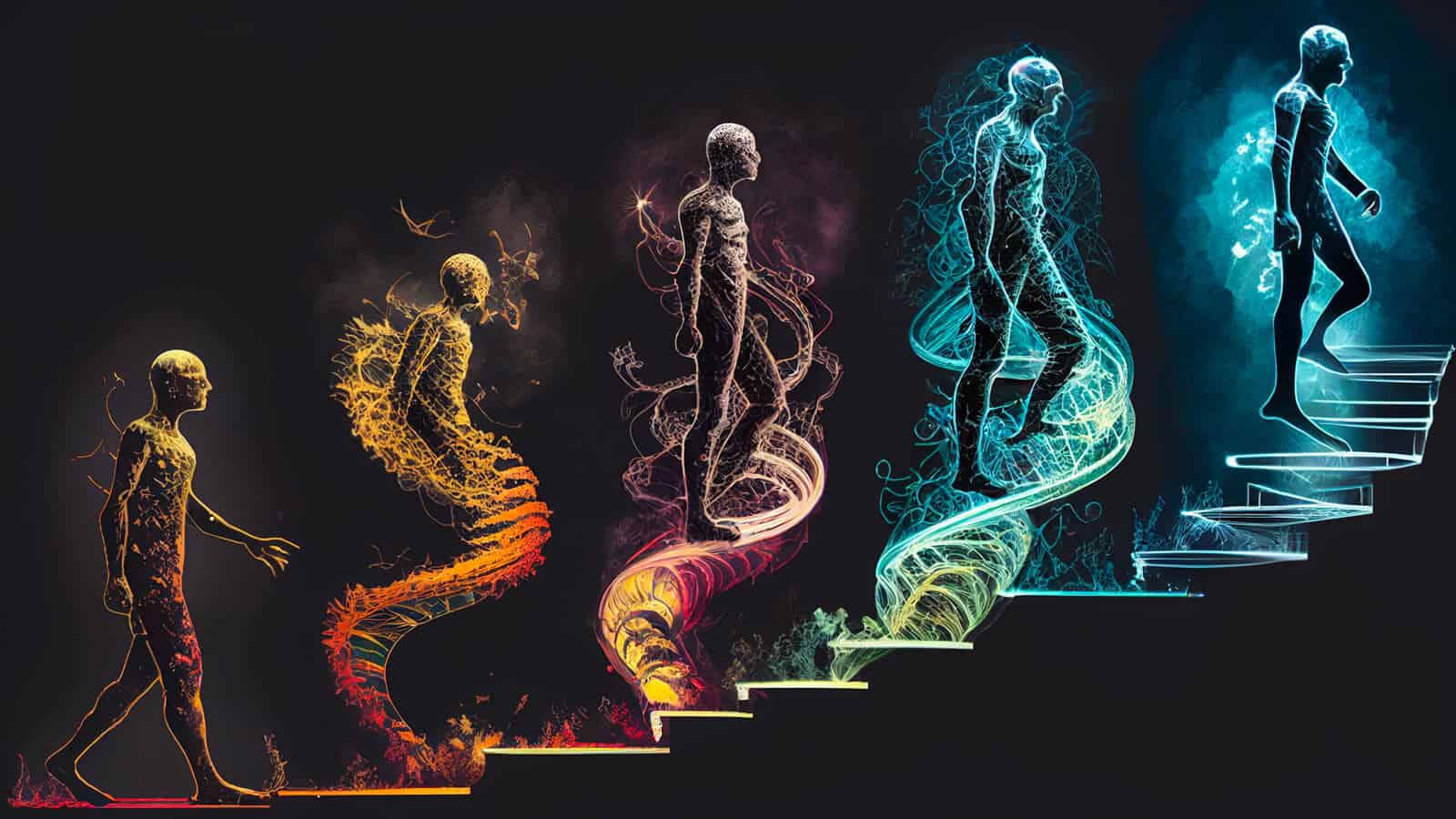Become a supporting member to watch the full conversation
Humanity is entering the Transformation Age, a new era of human civilization, with Integral Consciousness rising at its leading edge. Our members don’t use Integral Life as just another media subscription they use weekly or discard. Instead, most stay with us for years, using Integral Life to learn Integral Philosophy and build an integral mind slowly, methodically and when they need it. We’re here to help you shape the future that’s emerging no matter where your life takes you.
Get Full Access For $1 (7 days)* Or explore all membership plans → * Trial price for the first 7 days, then $20/month. Cancel or switch plans in 2 minutes at any time.Do psychological shadows, unresolved trauma, and attachment disorders slow down our cognitive development? What about our spiritual development? How would we know if that was happening to us, or to someone we love? And then what do we do about it?
Those familiar with the adult developmental models of Ken Wilber, Robert Kegan, Terri O’Fallon, and Suzanne Cook-Greuter understand how a healthy ego develops in theory, but what about the messy real world, where few of us (or arguably, none of us) have made it out of childhood without at least some trauma and attachment wounding?
Join Keith Martin-Smith and Kim Barta for an exclusive discussion as they delve into the world of shadow and ego development. Kim is a seasoned therapist, coach, and educator with over 40 years of experience who has dedicated his career to the resolution of shadow material. His unique perspective on the intersection of development, trauma, and attachment disorders combines the best of developmental psychology with depth psychology.
The conversation covers a number topics, including the concept of shadow, the stages of self-awareness and development, the culture wars, and the potential pitfalls of Green compassion. The speakers also touch on the development of trauma and shadow work within the egoic developmental process. Kim and Keith emphasize the critical importance of shadow work, as well as developing natural flowing states, stage development, and community interaction, and offers various tools and techniques for resolving core issues and achieving balance and integration of the self.

Topics include:
Understanding Psychological Development
Kim Barta, co-founder of Stages International, discusses the STAGES model and its use for understanding psychological development. Barta also talks about her approach to working with shadow, which incorporates multiple modalities and focuses on practical applications for personal growth.
Categorizing Shadow
Kim and Keith discuss the concept of shadow, its origin, and how it is understood in modern times. It is categorized into three classes: introjects, split ego states, and projections, which are important to address in personal development. The conversation discusses the concept of projection and how individuals may project their own traits onto others. It also explores how the ability to see one’s own projections evolves through different stages of ego development. Concrete projections are easier to recognize compared to subtle projections.
The Stages of Self-Awareness
Kim and Keith discuss the stages of self-awareness and development, from receiving subtle information to stepping outside and seeing oneself in the system. It also discusses the concept of the shadow and how to notice and address it.
The Culture Wars
The culture wars are a result of raising children with high level green values who become fundamentalist about it as they mature. They use cognitive biases to cherry-pick facts that support their ideology, causing conflict between left and right. They describe the difference between content and process in social development, specifically in regards to tolerance and ideology. It highlights how individuals at different developmental levels engage with and understand performative contradictions.
Hacking Green 4.0 Compassion
The conversation discusses the potential pitfalls of Green 4.0 compassion, which can easily be manipulated by groups claiming victimhood without reciprocating fairness. This can lead to a perpetuation of the same unhealthy power dynamics within organizations. The text discusses how individuals may falsely claim to be victims in order to manipulate others and gain control over the system.
Trauma and Shadow Work
The conversation also delves into the development of trauma and shadow work within the egoic developmental process. Kim and Keith discuss how individuals can project their trauma onto an out-group and gain in-group support while protecting themselves from confronting their abuser. The conversation also touches on how development can be hindered by trauma and how it can lead to the growth of the shadow self. The conversation revolves around the distorted thinking of an abused person and how it affects their development, leading to the example of Hitler who had a 4.5 Teal score but a deeply abusive shadow filter.
Adolf Hitler’s Cognitive and Moral Development
Experts in integral theory discuss Adolf Hitler’s cognitive capacities and low moral development, which allowed his acts of barbarism to be so effectively carried out. The discussion also explores the role of shadows in his behavior. They discuss how different developmental levels tend to push away previous developmental levels and how shadow work plays a role in this.
Jung’s Developmental Level
Jung is also mentioned as possibly being at a Teal level. The conversation discusses different developmental levels and the use of templates in teaching techniques. They also analyze Jung’s work and the danger of guessing someone’s development.
Shadow Resolution
The focus shifts towards shadow resolution and the different techniques used for different types of shadow. Incorrect assessments in psychological healing can cause damage by incorrectly integrating distorted information. It is important to release the incorrect information before integrating healthy ego states for holistic healing. This nuance is taught in Kim’s courses.
Psychotherapy Modalities
Kim and Keith discuss the different modalities in psychotherapy, particularly for working with pre-linguistic trauma or shadow material, which can be held somatically or sensorially without language. Therapists can use different modalities to resolve issues depending on the client’s needs.
Integration and Balance of Self
Kim and Keith discuss the integration and balance of the victim and dominant controlling selves, as well as the importance of balancing state work, stages, shadow work, and engaging with the collective. It also touches on the concept of addiction as a shadow form of state work.
Spiritual Bypass
Kim and Keith discuss the concept of spiritual bypass and the importance of using appropriate tools to deal with trauma, such as shadow work. It emphasizes that following the natural evolutionary flow of consciousness is key to personal development.
Natural Evolutionary Flow of Consciousness
Kim describes the natural evolutionary flow of consciousness and how disturbance arises. It emphasizes on leaning into disturbance and healing it, rather than just running away to state or stages. It talks about how the ideology that drives us towards state work or shadow work may often be a shadow in itself.
Dissolving Ego Structures
The discussion also mentions how some spiritual teachers have the capacity to dissolve ego structures as they’re arising, which makes it difficult for them to see shadows. It suggests that instead of just dissolving the leaves of the shadow tree, one should follow down the trunk to the core root and pull it out to avoid the production of more shadow leaves.
Resolving Core Issues
The conversation discusses the idea of resolving core issues in personal development and the importance of holding spiritual teachers accountable for problematic behavior stemming from unresolved trauma and shadows. The Wilber-Combs matrix is mentioned as a tool for understanding developmental stages and states.
Kim’s Courses
Kim discusses the concept of shadow work and its limits, emphasizing the importance of functionality over perfectionism in leading a beautiful life. He suggests that at some point, shadow work can have diminishing returns and that it’s crucial to assess where natural energy flows to produce the most beauty in the world.
Importance of Shadow Work
The conversation discusses the importance of doing shadow work as well as developing natural flowing states, stage development, and community interaction. They also address the idea of self-deception and the negative aspects of going away from source consciousness.
Shadow Recognition
Kim and Keith discuss how individuals deceive themselves into not acknowledging their shadow and mentions various defense mechanisms. It also provides examples of identifying the classic shadow and describes how to differentiate between projection shadow and perception. Disturbance is a marker of a problem being due to the shadow.
Shadow Resolution Program
The speaker runs a shadow work program that has been separated from their stages program. They discuss their evolution of shadow resolution program and how it helps identify progress in shadow work.
Introject and Integration Work
The conversation ends with a question about introject and integration work. The discussion revolves around the release of introjects and the potential energy that arises from it. This energy can lead to new states and stages, but does not necessarily require classic ego state integration work. Keith and Kim express appreciation for each other’s work.
Keith Martin-Smith’s When The Buddha Needs Therapy is now shipping!
It is possible to be liberated from the suffering of this world, but the path is a paradoxical one of embracing your ego even as you let it go. If you seek true liberation and freedom from the seemingly endless strife of life, you’re in the right place. Start building your big picture mind & support the global emergence of Integral consciousness “Integral Life is the most important and globally-relevant platform for the leading edge of Integral consciousness evolution” – Eugene P. Kim Barta is an internationally recognized psychotherapist, award winning lecturer, writer and workshop creator. Kim possesses a golden combination of deep compassion, skillful application, decades of deep embedded experience, clarity of presence, and international recognition with rave reviews. Keith Martin-Smith is an award-winning author, writing coach, and Zen priest. He is passionate about human connection, creativity, and evolution. His books include "The Mysterious Divination of Tea Leaves", "A Heart Blown Open", and "The Heart of Zen". His most recent book is his first novel, "Only Everything", a novel that explores the promise and the pain of following an artist's path.
Previous Episodes of Buddha In Therapy

Become a member to access the full episode

![]()
About Kim Barta
![]()
About Keith Martin-Smith



















